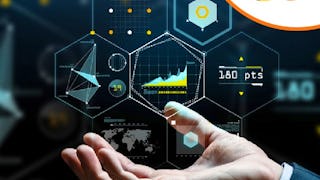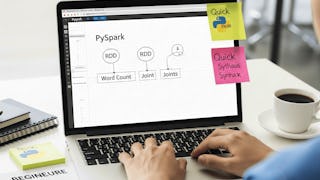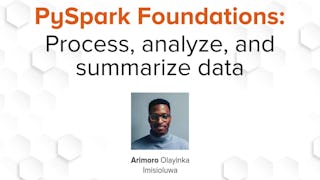Data Streaming and NLP with PySpark explores streaming data processing and NLP using the power of distributed computing. This course equips learners with the skills to build scalable data-streaming applications and perform advanced NLP tasks on large datasets. Through hands-on labs, you will gain practical experience in processing streaming data and applying NLP techniques using PySpark.

Enjoy unlimited growth with a year of Coursera Plus for $199 (regularly $399). Save now.

Data Streaming and NLP with PySpark
This course is part of PySpark for Data Science Specialization

Instructor: Edureka
Included with
Recommended experience
What you'll learn
Analyze streaming data to extract insights and trends in real-time applications.
Analyze real-time data streams and apply Spark Streaming techniques for efficient processing.
Develop robust streaming applications using Spark's Structured Streaming for fault-tolerant processing.
Implement NLP techniques to process and analyze textual data efficiently.
Skills you'll gain
Details to know

Add to your LinkedIn profile
16 assignments
See how employees at top companies are mastering in-demand skills

Build your subject-matter expertise
- Learn new concepts from industry experts
- Gain a foundational understanding of a subject or tool
- Develop job-relevant skills with hands-on projects
- Earn a shareable career certificate

There are 5 modules in this course
This module introduces the fundamentals of stream processing with Apache Spark. It covers how data is processed in real-time, the various models for handling data streams, and different architectures used in stream processing systems.
What's included
16 videos4 readings4 assignments1 discussion prompt
In this module, learners will explore Spark Streaming, its core concepts, and the evolution towards Structured Streaming. They will gain an understanding of the DStream abstraction, and the structure of Spark Streaming applications, and explore transformations alongside recent updates.
What's included
8 videos4 readings3 assignments1 discussion prompt
In this module, learners are introduced to the fundamental concepts of Structured Streaming in Spark, with a focus on its programming model, core operations, and management of streaming workflows. They will explore structured data processing in both batch and stream contexts.
What's included
33 videos4 readings4 assignments1 discussion prompt
This module covers the integration of PySpark with Deep Learning and Natural Language Processing (NLP), followed by optimization strategies for PySpark applications. Learners will explore the foundations of deep learning, NLP techniques, and best practices for performance tuning.
What's included
29 videos5 readings4 assignments2 discussion prompts
This module is meant to test how well you understand the different ideas and lessons you've learned in this course. You will undertake a project based on Spark NLP and complete a comprehensive quiz that will assess your confidence and proficiency in Data Streaming and NLP with PySpark.
What's included
1 video1 reading1 assignment1 discussion prompt
Earn a career certificate
Add this credential to your LinkedIn profile, resume, or CV. Share it on social media and in your performance review.
Explore more from Data Analysis
 Status: Free Trial
Status: Free TrialEdureka
 Status: Free Trial
Status: Free Trial Status: Free
Status: Free Status: Free Trial
Status: Free Trial
Why people choose Coursera for their career





Open new doors with Coursera Plus
Unlimited access to 10,000+ world-class courses, hands-on projects, and job-ready certificate programs - all included in your subscription
Advance your career with an online degree
Earn a degree from world-class universities - 100% online
Join over 3,400 global companies that choose Coursera for Business
Upskill your employees to excel in the digital economy
Frequently asked questions
Yes, this course is designed to introduce NLP concepts, making it accessible for beginners. However, a basic understanding of NLP principles will be beneficial.
A basic understanding of Python programming, familiarity with data processing concepts, and some exposure to natural language processing (NLP) will help you succeed in this course.
This course is ideal for data professionals, aspiring data engineers, machine learning enthusiasts, and anyone interested in real-time data processing and NLP applications.
More questions
Financial aid available,

